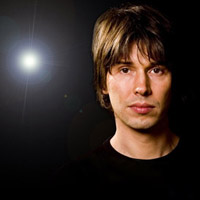Brian Cox (physicist)
From Wikipedia, the free encyclopedia
| Brian Cox | |
 |
|
| Born | 3 March 1968 Oldham, Lancashire, England |
|---|---|
| Nationality | British |
| Fields | Particle Physics |
| Known for | LHC, D:Ream |
Professor Brian Cox, also known as B. E. Cox (born 3 March 1968, Oldham, Lancashire, England),[1][2] is a particle physicist, a Royal Society research fellow, and a professor at the University of Manchester. He is a member of the High Energy Physics group at the University of Manchester, and works on the ATLAS experiment at the Large Hadron Collider, CERN near Geneva, Switzerland. He is also working on the FP420 R&D project in an international collaboration to upgrade the ATLAS and the CMS experiment by installing additional, smaller detectors at a distance of 420 meters from the interaction points of the main experiments.[3]
He is best known to the public as the presenter of a number of science programmes for the BBC. He also had some fame in the early 1990s as keyboard player in the UK pop band D:Ream. He is married to TV personality Gia Milinovich, and has a stepson.[4]
Contents |
[edit] Studies and career in music
After attending Hulme Grammar School in Oldham he studied Physics at the University of Manchester where in 1993, while still studying, he joined D:Ream,[5] who had several hits in the UK charts, including a number one hit, New Labour election anthem Things Can Only Get Better.[6] By the time D:Ream disbanded in 1997, Cox had earned a first class honours degree in physics from the University of Manchester, where he was later awarded a PhD in high energy particle physics, based on his thesis drawn from work he did for the H1 experiment at the particle accelerator HERA at the DESY laboratory in Hamburg.[7]
[edit] Academic, television and radio
Cox has received many awards for his efforts to publicise science. In 2002 he was elected an International Fellow of The Explorers Club and in 2006 Cox received the British Association Lord Kelvin Award for this work. A frequent lecturer, he was keynote speaker at the Australian Science Festival in 2006.
Cox is also known for his involvement in science programmes for BBC radio and television, including In Einstein's Shadow,[8] the BBC Horizon series[9] ("Large Hadron Collider and the Big Bang", "What On Earth Is Wrong With Gravity", "Do You Know What Time It Is?" and "Can We Make a Star on Earth?") and for voiceovers on the BBC's Bitesize revision programmes. Cox was the science advisor for the sci-fi film Sunshine and was featured on the Discovery Channel special Megaworld: Switzerland. He also gives regular lectures on the LHC.
Brian is a regular contributor on the BBC6Music Breakfast Show with Shaun Keaveny, with a weekly feature.
[edit] References
- ^ British Council, UK Achiever - Brian Cox, Issue 14, Volume 7, retrieved 6 September 2008
- ^ Oldham Advertiser, "Things have only got better for Brian", 11 April 2007, retrieved 6 September 2008
- ^ FP420 R&D Project, FP420, 16 October 2007, retrieved 6 September 2008
- ^ Hunt-Grubbe, Charlotte, "A life in the day: Dr Brian Cox", Sunday Times, 24 February 2008, retrieved 6 September 2008
- ^ Courier Mail, "Rock star's new frontier"[dead link], 9 August 2006, unable to retrieve on 6 September 2008
- ^ everyHit.com, UK top 40 hit database (search result for D:Ream), done 6 September 2008
- ^ apolloschildren.com, Professor Brian Cox (with downloadable postscript file), retrieved 6 September 2008
- ^ bbc.co.uk, In Einstein's shadow, January 2005, retrieved 6 September 2008
- ^ Sue Rider Management, Professor Brian Cox, retrieved 6 September 2008
[edit] External links
| Wikiquote has a collection of quotations related to: Brian Cox (physicist) |
- Official Website
- CERN podcasts
- Brian Cox at TED
- Brian Cox interview at www.sci-fi-online.com
- Brian Cox page at Sue Rider Management
- Dr. Brian Cox at the Internet Movie Database
- List of papers by Brian Cox
- Guardian profile of Brian Cox
- Lecture
- D:Reams Coming True For Rock Star Physicist (Interview)
- TED Talks: Brian Cox on CERN's supercollider at TED in 2008

